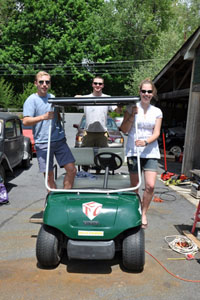Technology Clinic strives to create jobs through manufacturing solar golf carts
 With the economy slowly rebounding from a downward spiral, job creation is a hot-button issue in regions throughout the country. Working with the Slate Belt Council of Governments and the Slate Belt Business Incubator Program, an ambitious Technology Clinic team of six students is developing a green, low-speed vehicle (solar golf cart) for possible manufacture in that region.
With the economy slowly rebounding from a downward spiral, job creation is a hot-button issue in regions throughout the country. Working with the Slate Belt Council of Governments and the Slate Belt Business Incubator Program, an ambitious Technology Clinic team of six students is developing a green, low-speed vehicle (solar golf cart) for possible manufacture in that region.
“Integrating community members is always beneficial because it allows us to create ties and connections in this region that span well beyond the College,” explains policy studies major Jayne Miller ’10 (Bethel, Pa.). “It also gives our project depth; as we met people, our venture was more than a hypothetical situation relating to job creation. We know the faces and names of individuals who have a real stake in this region and are looking at our analysis to improve the quality of life in the Slate Belt.”
In addition to Miller, the team consists of engineering studies majors Dietrich Hoefner ’10 (Takoma Park, Md.) and Adam Lessen ’10 (Dresher, Pa.), geology major Emily Melvin ’12 (Seaford, N.Y.), government & law and anthropology & sociology double major Zachary Romano ’10 (Hawley, Pa.), and electrical and computer engineering major Shailesh Shrestha ’11 (Pokhara, Nepal). Dan Bauer, professor of anthropology and sociology; William Hornfeck, professor of electrical and computer engineering; and Joe Shieber, assistant professor of philosophy, are the faculty advisers.
The team began by researching the region to gain a sense of current business challenges, focusing on zoning issues and permits. It also studied the green golf cart, an idea from Hornfeck, as an example of something that can be manufactured in the Slate Belt. The students also explored the financial feasibility of starting a project of this magnitude.
As they worked to get the project off the ground, the group’s major goal was to design creative solutions, such as the solar golf cart, and determine how those ideas could be put into practice in the community. But, Miller warns, the project is a process and will take time. Still the team is pleased with its progress and how it integrated perspectives from a variety of disciplines to take on a complex problem.
“As we are an entirely interdisciplinary team, I found observing the process of my peers from other fields to be the most rewarding,” says Miller. “My contributions were rooted in communicating with members of the Slate Belt and tackling the issue from a very ‘right-brained’ place. When it came time to talk finance or engineer a product to be manufactured, I took on the role of humble observer to see what the rest of the team would come up with.”
The students also took on the roles of teachers as they showed off skills foreign to their counterparts in different majors.
“We all come from such different backgrounds and contribute so uniquely to the final product,” says Miller. “It was [satisfying] to be in an environment where you’re allowing peers to show you how it is they attack a problem or what it is exactly they’ve been studying at Lafayette for the past four years. I learned the most from fellow students who sat in Dan Bauer’s office with me every week than from anything else.”
 With the economy slowly rebounding from a downward spiral, job creation is a hot-button issue in regions throughout the country. Working with the Slate Belt Council of Governments and the Slate Belt Business Incubator Program, an ambitious Technology Clinic team of six students is developing a green, low-speed vehicle (solar golf cart) for possible manufacture in that region.
With the economy slowly rebounding from a downward spiral, job creation is a hot-button issue in regions throughout the country. Working with the Slate Belt Council of Governments and the Slate Belt Business Incubator Program, an ambitious Technology Clinic team of six students is developing a green, low-speed vehicle (solar golf cart) for possible manufacture in that region.